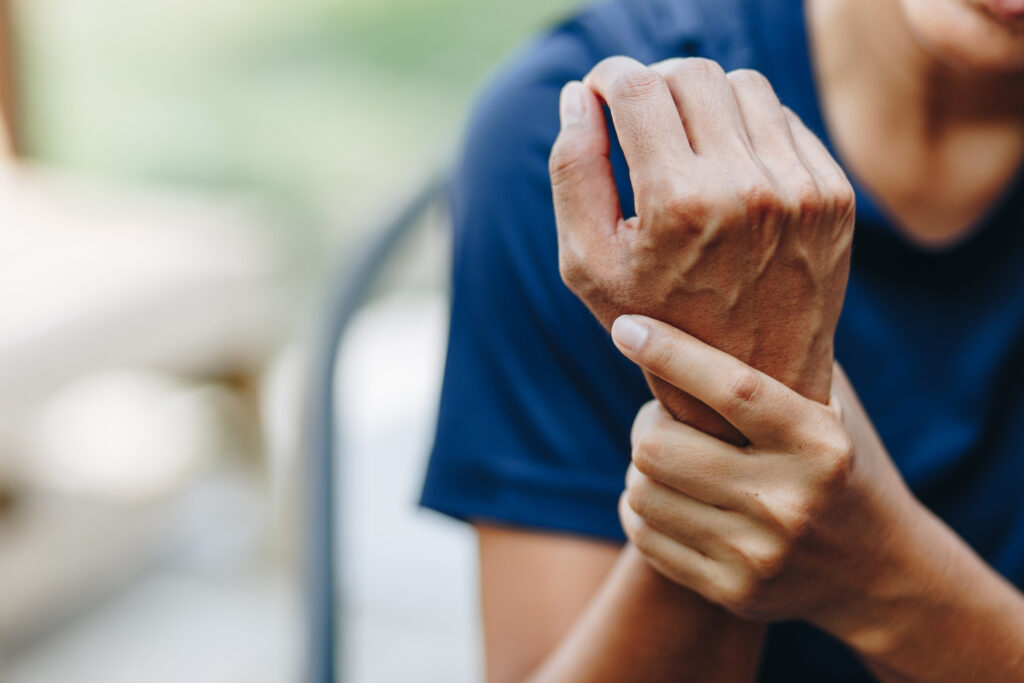Reduce Chronic Joint Pain in the Summer, With These 5 Tips:
Chronic pain conditions can interrupt your daily schedule of activities, through the year, but particularly in the Summer. The extreme heat can increase your pain symptoms, during a time where kids are home from school, and family visits are a plenty. Here are 5 tips on how you can reduce chronic pain during the summer months.
1. Stay Cool
Changes in temperature and barometric pressure can trigger joint pain. People with chronic pain conditions often already have difficulty regulating their system, so extreme shifts in weather from spring into summer can put additional strain on their body to adjust. Stay cool by heading indoors where you can run a fan or air conditioner to cool your body down. Shifting the schedule of your outdoor activities to the early morning or late evening will help avoid times when the sun is at its peak strength. If your schedule doesn’t allow early morning or late evening activities, swimming is a great summer activity that provides the benefits of low-impact exercise with temperature regulation. Other ways to cool off while outside include using a misting fan, cold pack, or sprinkler to keep the heat at bay.
2. Stay Healthy
Many people are reluctant to heat up the house by firing up the stove on hot days and instead resort to eating out or ordering delivery. Make sure you are choosing healthful foods. Summer is the perfect time to swap out sugary snacks or desserts for fruit rich in antioxidants and inflammation fighters, such as fresh berries, melons, and peaches. The USDA Agricultural Research Service found that cherries contain pain-fighting and inflammation-reducing compounds that can help you minimize your pain.
During the summer, it is especially important to pay attention to the air quality ratings before heading outdoors. Research published in the American Journal of Respiratory and Critical Care Medicine shows that urban air pollution increases inflammation. High levels of air pollution should be avoided by people with chronic conditions such as fibromyalgia, chronic pain syndrome, and multiple sclerosis. Before spending significant amounts of time outside, check the current Air Quality Index (AQI). In New Jersey, you can check the AQI here.
3. Stay Connected (With Your Doctor)
Don’t let summer vacations or road trips get in the way of your treatment plan. Check in with your doctor before you go. This is the perfect opportunity to request a prescription refill if you will be out of town for an extended period. You can also review your care plan and determine if any activity restrictions would be appropriate based on your condition.
At Metropolitan Pain Consultants, we recognize that our patients have busy lives, so we offer convenient Saturday appointments in addition to our regular office hours. Give us a call at 201.729.0001 to schedule a consultation at any of our 3 office locations.
4. Stay Comfortable
Lots of summer activities involve uncomfortable furniture – think bleachers at a ball game or lumpy air mattresses during a camping trip. Plan ahead by bringing a cushion to sit on that more evening distributes the weight in your hips or a lumbar support for long car rides.
If you’ll be doing walking or hiking, be sure to wear comfortable shoes and consider bringing a walking stick. Patients with spinal stenosis and arthritis have reported the extra support from a walking stick helps in reducing their pain during summer outdoor activities.
5. Stay Active & Hydrated
Lounging by the pool is great, but it’s important to get in and swim once in a while to keep your muscles active. If you don’t like the water, take a break to walk around the beach a bit before settling back down. Other low-impact outdoor exercises include gardening, cycling, and yoga. For those with knee pain or hip pain, kayaking is a great aerobic exercise you can perform from a seated position.
It is important to stay hydrated, especially in the summer when the heat requires higher water intake for your body to function properly. Dehydration can lead to fatigue, muscle cramps, and headaches, as well as exacerbate existing chronic pain symptoms.
If you have questions about managing your chronic pain condition during the summer, please give us a call, or find your local Physical Therapy facility online. We are here to help.


